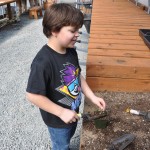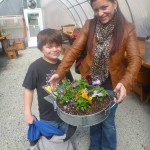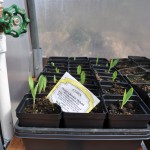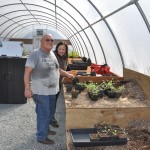Robby Kublic Memorial Hoop Tourney, may 17, 18, 19 at the Tulalip Tribes
Category: Tulalip News
Earth Day celebration at the Qwuloolt Estuary
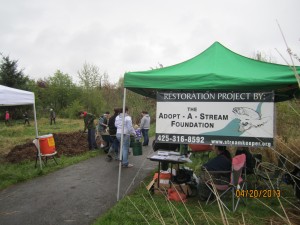
Article by Monica Brown
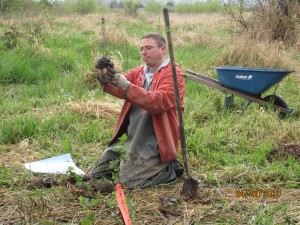
Photo by Monica Brown
TULALIP, Wash. – Community members chose to celebrate Earth Day on April 20th, by helping plant native trees and shrubs in the Qwuloolt Estuary located on the South end of Marysville. The Adopt a Stream Foundation (AASF) is guiding this portion of the project by planting the native trees and shrubs which have been made possible by a grant from the Washington State Department of Ecology through a $250,000 Allen Creek Grant. The main focus of the grant is to work with and inform nearby homeowners that live near the Allen Creek watershed about the restoration project. Walter Rung, Ecologist from the AASF says “We are going to door to door and talking to them about ways to help improve water quality in the creeks.”
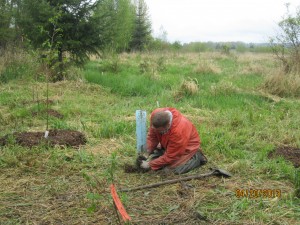
Photo by Monica Brown
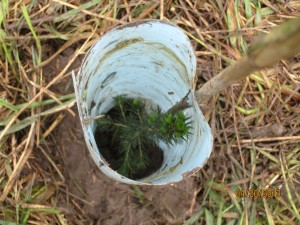
Photo by Monica Brown
The expected outcome of the restoration project is to raise the population of salmon, and migratory birds that inhabit the Qwuloolt Estuary and it’s tributaries. Planting native vegetation is one way of helping to improve water quality. CK Eidem from the AASF informs, “Today we’re putting in about 100 potted stalk and 100 live stakes; potted stalk are potted plants and live stakes are a cutting from a tree which will grow into a shrub if planted at the right time of year,”
Other environmental changes are being made such as improving natural channel formation and eventually removing the tide gate. The tide gate is located just south of the storm water Treatment Facility and should be taken down within a year.
“We’re expecting once they remove the tide gate that there will be a lot more salmon in the creek,” said Walter Rung.
At the estuary project, informational booths and speakers informed people about how to protect the estuary and streams in the area by simple methods of not using toxic chemicals in their yards for weed control, disposing of pet droppings properly and regular maintenance their septic systems. Staff from Tulalip Tribes Natural Resources Department explained the stages and reason of the restoration project and provided delicious samples of Sitka Spruce tea and Nettle Tea.
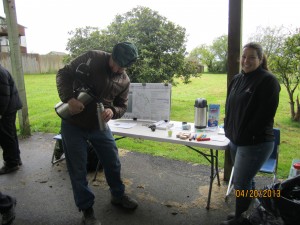
Photo by Monica Brown
This project has been made possible through a large partnership between The Tulalip Tribes, City of Marysville, U.S. Army Corps of Engineers, National Oceanic and Atmospheric Association, Sound Transit, Wash. Dept of Fish and Wildlife, Wash. State Recreation and Conservation Office, Natural Resources Conservation Services, Snohomish Basin Salmon Recovery Forum, Sound Salmon Solutions and U.S. Fish and Wildlife Service.
Tribal member Tyler Fryberg trains for NW Regional Spring Sports Festival
Article by Monica Brown

Photo by Brandi Montreuil
Tulalip Tribal member Tyler Fryberg has set his mind to return to the Special Olympics Summer Games this year. Tyler has been participating in sports activities like track and field, cross country, basketball and bowling, since high school. Prior to the summer games last year, Tyler was asked to carry the Special Olympics Torch, which he gladly accepted and ran 18 miles.
“I definitely want to carry the torch this summer,” said Tyler “it’s so much fun.”
For the past few weeks Tyler and the Marysville team have been training and preparing for the Northwest Regional Spring Sports Festival on May 5th, 2013 at Marysville Pilchuck High School. Tyler will make every effort during the festival to qualify for the Special Olympics Summer Games that will be held at Joint Base Lewis – McChord on May 31-June 2.
This year at the festival, Tyler will be taking part in the 100 meter and the 4 X 100 meter relay along with two extra events; the shot put and the 400 meter.
“I’m okay at shot put” says Tyler, “The ball is eight pounds and my best throw is ten meters.” Tyler has been practicing the shot put since the beginning of winter.
Even though Tyler has FAS (Fetal Alcohol Syndrome), he has not let that determine his limits in life. In high school Tyler was accepted on the varsity track team at Monroe High School and ran a 5:28 mile. Tyler explains, “For someone that has a disability, I was trying to prove that they could get on the varsity track team, and I did. I was on the varsity team for two years.”
Tyler maintains a busy schedule of sports, training, school and volunteering. His favorite sport is running, but Tyler participates in other activities such as bowling and basketball.
“I actually won the bowling tournament, that was kind of cool.” boasts Tyler.
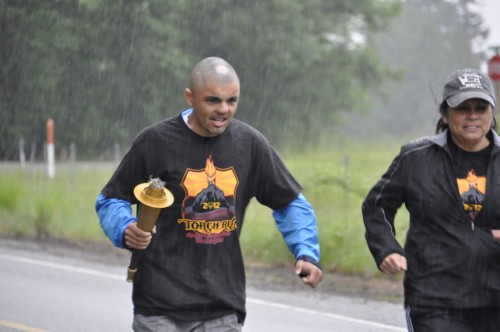
Photo by Brandi Montreuil
Along with sports, Tyler has an active interest in criminal justice. Last year he began taking criminal justice classes at Everett Community College. He contacted the Tulalip Police Department (TPD) and met with the Police Chief at the time, Jay Goss, and began volunteering in the office.
“It’s an interesting story,” laughs Tyler, “I came in and asked for a ride-along, I had a meeting with Chief Goss and I told him all about myself, and that because I have a disability I couldn’t get a real job, but he said I could volunteer instead.” At the TPD, Tyler gains extra experience in the criminal justice field by helping out around the office.
“Ty is very helpful,” says Shawn Edge of the Tulalip Police Department, “he’s always here at the busiest time of the day and he’s always here to help with the stuff that we can’t get to. “
2nd Annual Opportunity Expo
Article by Monica Brown
TUALIP, Wash. -The Opportunity Expo had its second successful year. Marysville Rotary, Marysville School District and The Tulalip Tribes coordinated this year’s Expo. Students preparing to graduate were ushered into the Expo where they could speak with a variety of recruiters and employers about their plans for their future.
The Opportunity Expo booths included over 100 different vendors, including colleges, universities, and vocational and technical schools from across the country, along with law enforcement, military recruiters, and top employers like Boeing.
Gardening Together as Families begins its second year
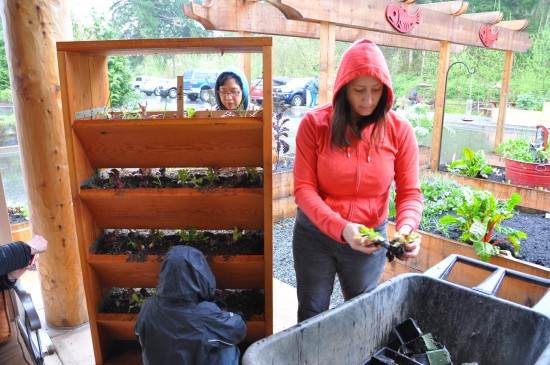
Article by Monica Brown
TULALIP, Wash.- The Hibulb Cultural Center’s Gardening Together as Families event was planned for Saturday April 13, 2013, rain or shine. Despite the cold and rainy weather, gardeners began arriving at ten am, dressed in rain gear and ready to garden. They made their way inside the Cultural Center where they enjoyed traditional prayers and songs prior to heading out to the garden and greenhouse.
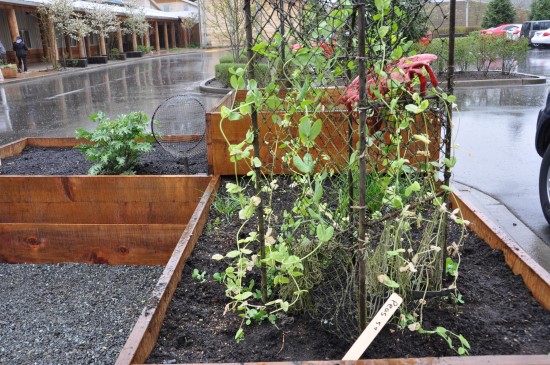
Photo by Monica Brown
In the garden’s raised planter boxes they replanted the starts from the green house. Cabbage, cauliflower and broccoli were all placed in the raised beds. Sugar snap peas were replanted in a raised bed and given an old crab pot to vine on. A spring mix variety of lettuce was replanted in a lettuce wall that looks like upside down stairs to maximize space and water. These cold weather plants are hardier to cold and some freezing temperatures. While the sweet peas and broccoli may produce all summer, cabbage, cauliflower and lettuce will need to be reseeded after they are done producing.
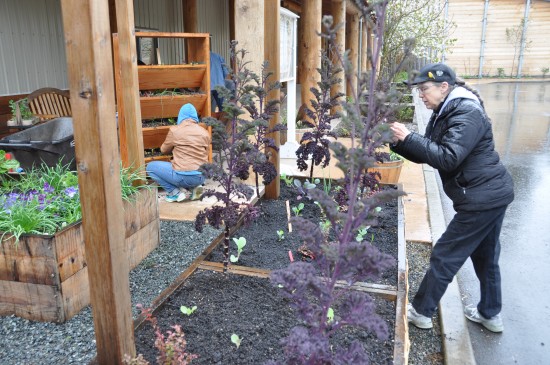
Photo by Monica Brown
Early spring plants that are able to withstand the cooler temperatures were already thriving in the raised planter boxes. Master Gardener Michelle Taylor coerced me to try the fresh Kale that she tore from the stalk. Kale is surprisingly refreshing, sweet and tender; it is similar in taste to sweet peas. Michelle explained how Kale is an easy vegetable to grow in this area of Washington and is full of nutrients like Iron, fiber, calcium, Vitamins C, A and K. Kale is simple to cook with and prepare, it’s great in salad, soup, casserole, or in a smoothie.

Photo by Monica Brown
Gardener Carol Kapua was enthralled when she saw the large artichoke that it was “so very healthy” and explained how the artichoke will grow and mature on the inside of the bushy plant. Artichoke is not usually grown in this wet climate and is a bit of a finicky perennial but is able to be grown as a low maintenance annual. The artichoke plant will need to be “overwintered” a term which means the plant will need to be cooled to a low temperature of 30 degrees in order to flower.
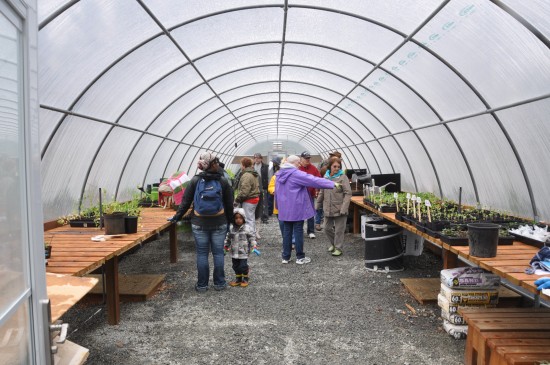
Photo by Monica Brown
The next Gardening Together as Families event will be in May. All levels of experience are welcome and Gardeners do not need to bring any tools, although if you have your own garden gloves, knee pads etc. you are welcome to bring them. At the end of each Gardening Together as Families event a delicious and nutritious lunch is prepared by the Cultural Center staff.
For more information or you would like to attend future garden events please contact Veronica Leahy at (360) 716-5642 or email vleahy@tulaliptribes-nsn.gov
Muckleshoot Food Sovereignty Project awarded $37,500 grant
NAFSI grant will aid Muckleshoot in their efforts to access more traditional foods
By Monica Brown Tulalip News writer
The Muckleshoot Food Sovereignty Project has been awarded a $37,500 grant from the First Nations Development Institute. The grant will help fund the project s explorations of the Muckleshoot Tribe’s food assets and increase access to local, healthy and traditional foods. Through explorations, participants will gain an understanding of Native foods and build food security throughout the community.
Project participants enjoy community engagement through workshops, harvesting and feasts. Hands-on workshops are designed to teach traditional food principles and how to approach preparing them in a more modern way. Project coordinator, Valerie Segrest states
“The Muckleshoot Food Sovereignty Project is community driven and aims to increase access and revitalize a traditional and local healthy food system.”
Tribal cooks and established community groups are coming together to develop a new policy about food which will focus on a more traditional and nourishing food program. The new policy development is facilitated by professional chefs who are invited to meet with tribal cooks and the community groups during cook retreats. The project participants are working to join tribal kitchens and create a menu program. By creating a reliable menu that can be used throughout tribal kitchens they will be able to assess the food quantities needed for when they are ready to produce their own food. The menu program will also inform the five-year food sovereignty/action plan that is currently being organized.
The project comes from a community based participatory research project which was conducted in partnership with Northwest Indian College and the Burke Museum in 2007. The project operates year round and is open to all community members.
The First Nations Development Institute’s Native American Food System Initiative (NAFSI) grant is intended to help tribes and Native communities build sustainable food systems such as community gardens, food banks, food pantries and/or other agricultural projects related to Native food-systems control. The 31 grants were made possible by the generous support of the AARP Foundation, The Christensen Fund, CHS Foundation, U.S. Department of Agriculture Office of Advocacy and Outreach, U.S. Department of Agriculture Rural Development, Walmart Foundation, and the W.K. Kellogg Foundation.
To read more about the Muckleshoot Food Sovereignty Project please visit their website at
Muckleshoot Food Sovereignty Project
More reading:
Spring gardening at Hibulb
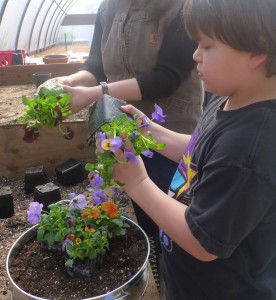
By Monica Brown
TULALIP, Wash. Attendees at the Tulalip Hibulb garden work party gathered together on Friday, March 22 to do some needed garden preparations. Gardeners and gardening volunteers worked together to prepare the garden for the growing season.
Pruning encourages fruit production, so Master Gardeners Frank Sargent and Rob and Richelle Taylor pruned fruit trees located in the orchard on the north side of the Hibulb Museum.

Community gardeners worked in the greenhouse, transplanting over 100 seedlings of cabbage and sowing new seeds. Seedlings are being started and kept warm in the heated greenhouse and soon the plant beds around the museum will be made ready for transplanting.
The community is invited to attend the garden work parties and the Gardening Together as Families events. Gardeners will help tend the beds throughout the season and enjoy the rewards at the end of season harvest. Gardeners will learn about the many aspects of gardening through hands-on experience, working side-by-side with master gardeners.
To learn more about the Hibulb Gardening events please contact Veronica Leahy at 360-716-5642 or vleahy@tulaliptribes-nsn.gov
Tulalip elementary students graduate from self-defense class
By Kim Kalliber and Jeannie Briones; photos by Jeannie Briones
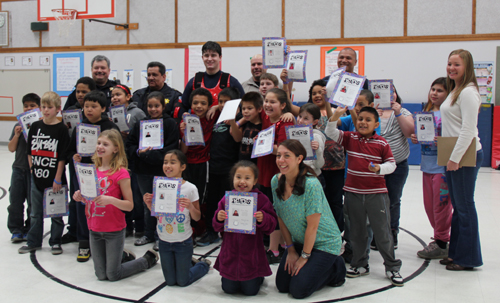
Empowerment, self-esteem and safety skills – these are a few of the core values of the radKIDS program and 21 proud radKIDS graduates are now armed with these important life skills. Tulalip police officers, instructors and
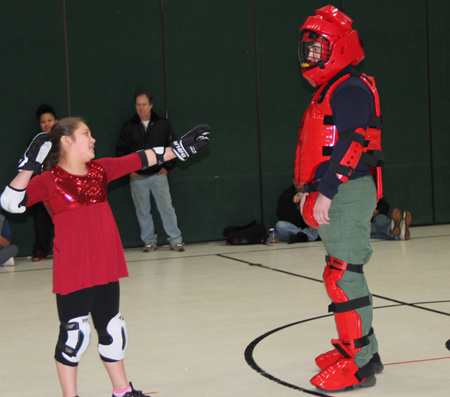
students celebrated the graduation at Quil Ceda & Tulalip Elementary School on March 26.
RadKIDS, which has been in operation at Quil Ceda & Tulalip Elementary for two years, is a non-profit educational organization dedicated to providing effective lifesaving skills to children. Through this program, kids become empowered to recognize and avoid dangerous situations, and to replace the fear and confusion they may feel in these situations with confidence and self-defense skills.
“There is no other program like it for safety. Students benefit from learning about safety, like being safe from a bully, staying away from drugs and alcohol and keeping safe from someone who’s trying to harm them,” said Rochelle Lubbers, Tulalip Police Department Emergency Services Manager and radKIDS Instructor.
During the graduation, students received a certificate and got to demonstrate their newly acquired self-defense skills against the “redman.” Tulalip police officer Mark Nelson wore the padded red suit to protect himself from the kids slick moves like shin kicks, toe kicks and knee kicks.
This training includes kids and their parents creating a password. A password is a word that is used as a safety check should a parent need to send another adult to pick up a child from school, sports, etc. The purpose of the password is to protect your child from going with someone under false pretenses. When approached by a stranger, the child will ask for a password, if the stranger does not know the password, the child is then taught to run away or seek help.
“We can get away from who tries to take us. It feels good to be safe,” said Nakoyia Fryberg, radKIDS graduate and Tulalip tribal member.
To learn more about the radKIDS program visit www.radkids.org













